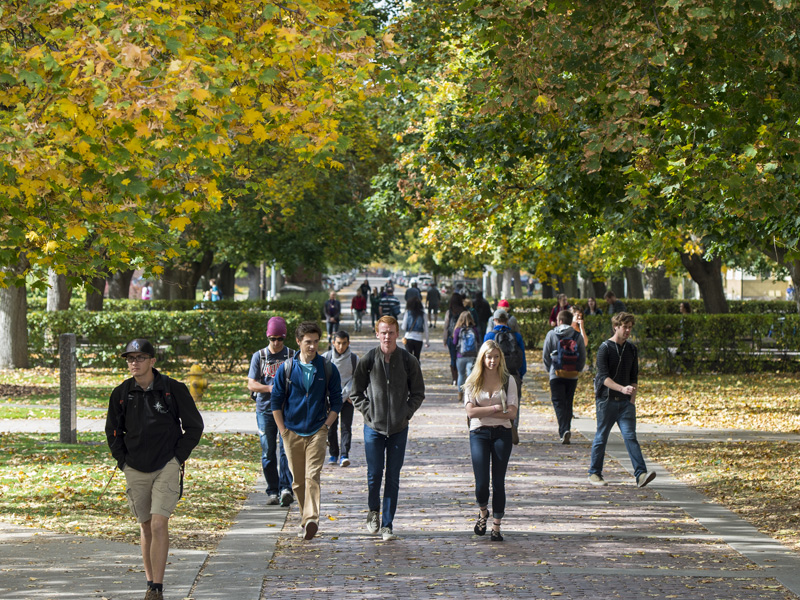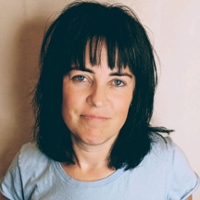- Editorial Offices
- 203 Brantly Hall
- Missoula, MT 59812
- (406) 243-2488
- themontanan@umontana.edu
Scholarships Launching Lives
Donors have gifted and pledged more than $100 million for student support during Campaign Montana.
Brit Garner’s work in international wildlife conservation sounds about as wild as the animals she studies. Her projects have focused on a wide range of scientific subjects, including invasive herpetology in the Everglades, shark attack risk assessments and DNA analysis of seals. As a doctoral candidate in UM’s renowned Wildlife Biology Program, she’s used big data analytics typically reserved for economics, business and marketing and applied these methods to international wildlife conservation.
“These new tools are what allows Netflix to suggest shows to us, businesses to optimize marketing strategies, Facebook to use targeted ads,” she says.
Netflix uses machine learning to predict what viewers want to watch next, but the application can be used in conservation, too.
“One of the coolest uses I’ve seen of machine learning in international conservation is happening right now in Africa,” she says. “There are teams using training sets of rhino poaching data to streamline algorithms that are now predicting where the next poaching event might occur. And, it’s working.”
Science communication also interests Garner – in other words, how professional scientists communicate their knowledge to the general public. Her UM education and connections led her to a production company called Complexly (owned by UM alumnus and YouTube entrepreneur Hank Green) for whom she co-hosts a wildly popular YouTube channel called “Sci-Show Psych,” which has more than 400,000 followers. She also is the sole host, researcher and writer for another channel called Nature League, which launched in March and serves as the perfect example of Garner’s ability to look at conservation through a global lens and explain it to the everyday viewer.
In April, Garner was awarded the W.A. Franke Endowed Fellowship in Wildlife Biology to support her continuing efforts at UM at a time when the Wildlife Biology department had just been ranked No. 1 in North America by Academic Analytics.
“This really changes the game for me,” she says. “To have an endowed fellowship to do what I’m doing is a huge deal.”
The fellowship is part of a large donation made in 2016 by Bill and Carolyn Franke and their family. The Franke family’s $24 million gift is the largest single gift in the University’s history, and it has caused a powerful ripple effect for students and programs alike. Of the $24 million, the W.A. Franke College of Forestry and Conservation received $18 million to support fellowships, scholarships, initiatives, faculty, internships and innovation. The other $6 million went toward the Franke Global Leadership Initiative, which supports students across all disciplines as they explore global challenges through hands-on, collaborative projects.
Franke family members are not UM alumni, but they have a deep appreciation for Montana. They believe strongly in the power of education, the importance of conservation and instilling a global perspective in today’s students. Over the course of the past decade, the family has developed a strong relationship with UM.
“What struck me was how a single family could be interested in really different applications of philanthropy and different areas of study,” Garner says. “When it was announced there was a lot of excitement in the forestry building – first of all because it is beyond generous, and also because it’s really cool to have someone recognize the work we’re doing is worthy.”
The fellowship will allow Garner to reduce her financial burden and focus on her rigorous exams and projects. It will give her a chance to meet in person with international task forces. She also plans to attend conferences where she can present her research, as well as network with some of the world’s biggest players currently working in international wildlife conservation.
“With private donations, there’s a very active choice being made on the part of the private individual,” Garner says. “With their donation they are saying, ‘I believe in what you’re doing, and I want to be a part of it.’ It means a lot to me because of that personal touch.”
The passion donors have for UM has resulted in a vast array of scholarships. During Campaign Montana, donors have gifted and pledged more than $100 million for student support. Several of those millions have been awarded to undergraduate and graduate students in the past few years. Other gifts have been directed by donors to endowments. These gifts will be invested and provide scholarship awards in perpetuity through investment earnings.
The type of scholarships established by donors include need-based awards to ensure students with limited resources have access to college. These include four-year renewable Presidential Leadership Scholarships awarded for academic merit that waive the full cost of in-state tuition, student-athlete scholarships that support promising athletes in their studies, and recruitment scholarships that attract top high school students from across Montana and around the nation. In addition, graduate fellowships, like Garner’s, financially support students pursuing graduate degrees. Despite this generosity, more financial support in the form of private scholarships is needed to ensure access to higher education and a thriving academic community for students.
Some donors, like Chris Halko, give because they have personally benefitted from their experience as Grizzlies and believe in the value of a UM education.
When Halko graduated from UM in 1995 from the School of Pharmacy, there was a shortage of jobs in his field, especially in bigger towns like Missoula. So Halko set his sights elsewhere. Thankfully, Jim Willits, a 1967 UM pharmacy graduate, contacted Halko and invited him to Fort Benton to check out the Benton Pharmacy, which Willits had owned for several decades.
“I came out here on a Saturday, and I met Jim and went and played the golf course,” Halko recalls. “And thought, ‘I think I’ll give this a try.’ At the time I was 22, single, didn’t know what I wanted to do. I started filling in for Jim, and I just fell in love with Fort Benton, fell in love with independent pharmacy and fell in love with the area.”
Halko wasn’t a stranger to the area: He’d grown up on a ranch in Centerville not too far away. But being back there, working at the charming old brick-and-wood store, re-energized his interest in small-town community life, and he started to see his presence there with greater purpose.
One of his inspirations was Willits himself. In 1993, Willits and his wife, Caroleen, set a goal to give $100,000 to UM over the course of several years.
“Jim really never said, ‘You need to invest in your community or you need to invest in your university,’” Halko says. “He just did it, and so he led by example. He is very generous, and so I ran with that.”
Halko took over the pharmacy in 2005 and opened another in Big Sandy in 2010. A few years later, he started his own scholarship fund with his wife, Terri, for the Skaggs School of Pharmacy, providing a $2,000-per-year stipend for pharmacy students.
“It’s been one of the most rewarding things I’ve ever done to meet these kids and hear their stories,” Halko says. “They write the most beautiful thank-you letters, too.
I understood what it was like to struggle to make payments in college, so it’s very heartwarming to hear from them.”
Pharmacy scholarships benefit students like Sylvia Gomez. She received several while studying at UM.
“I spent time volunteering and shadowing in several different areas of health care and found that pharmacy is what I was most interested in,” she says. “I find the interaction between body and medicine fascinating. Pharmacy is a field that will keep me challenged and learning throughout my career.”
Scholarships allowed her to focus on her studies and gave her the opportunity to volunteer at the Missoula Urban Indian Health Center, Ronald McDonald House and Red Cross Blood Drive, as well as tutor other students. Since graduating in 2016, Gomez has worked at the Benton Pharmacy. It’s a big change for her, having grown up in larger towns in California and going to school in Missoula, but she’s come to love the community and the flexibility of working for an independent pharmacy.
“Benton Pharmacy keeps a close relationship with the University of Montana, and it’s always great to have students with us on rotation,” she says. “I think the student always gets a good hands-on experience and the opportunity to learn about a lot of different aspects of pharmacy.”

Story by : Erika Fredrickson
Erika Fredrickson is a freelance journalist based in Missoula. She graduated from UM’s Creative Writing Program in 1999 and earned a master’s degree in environmental studies in 2009.




